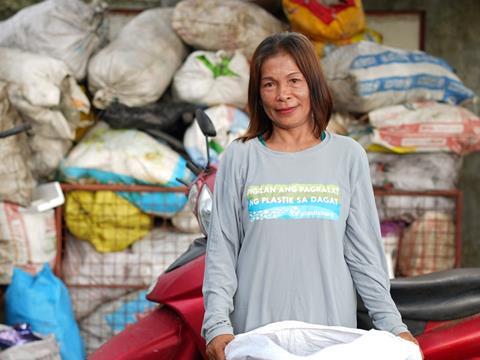
At the end of 2023, Greiner Packaging and Plastic Bank extended their partnership to collect plastic waste from coastal areas in the Philippines – an effort that is already said to have removed over 610 tons of plastic.
This marks the third time the companies have extended their partnership, which began in 2019. Around 2,000,000 tons of plastic waste generated in the Philippines is thought to end up in the ocean annually, with the country said to come third to China and Indonesia among the highest producers of plastic waste in the world.
Plastic Bank seeks to develop ‘ethical recycling ecosystems’ through five collection points in Manila. In part, this involves rewarding collectors with a bonus for the plastic they collect to bolster their income.
Meanwhile, the collected materials are reprocessed and introduced back into the global manufacturing supply chain. These joint benefits lead Plastic Bank to refer to the recycled material as ‘Social Plastic’.
At local Plastic Bank branches, collectors are encouraged to use their plastic waste as currency. They can swap it for incremental income and access to work, health insurance, meal vouchers, school supplies, and more – a system hoped to help impoverished collection communities access social benefits and traceable sources of payment.
So far, the equivalent weight of over 30 million plastic bottles have been collected from coastal areas, which are especially susceptible to the impact of plastic pollution. It is thought to have benefitted 1,660 people across 137 communities in the Philippines.
Greiner Packaging anticipates that the partnership will contribute to its goals of protecting the environment and enhancing sustainable practices in the future. With its “Join the Circular Revolution!” motto, it aims to encourage its value chain partners to join forces and pursue sustainability-minded solutions.
“We are all in agreement: someone has to do something about plastic in the ocean,” says Plastic Bank founder David Katz. “Plastic Bank and its partners, such as Greiner Packaging, are part of the solution.”
Beatrix Praeceptor, CEO of Greiner Packaging, adds: “We’re extremely happy to extend our collaboration with Plastic Bank for the third time. This ongoing partnership reflects our strong commitment to a sustainable future.
“We are aware that we cannot solve the entire plastic waste problem in the Philippines. However, our cooperation has a significant impact on the lives of local people.”
When their collaboration was previously extended, the companies reported that their efforts had resulted in the collection of 331.5 tons of plastic waste in recent years, which equated to 16.5 million plastic bottles. As such, its collection rate has almost doubled.
In other news, Plastic Bank is also working with SIG and Deutsche Gesellschaft für Internationale Zusammenarbeit (GIZ) to tackle the issue of plastic waste and improve the livelihoods of around 1,000 Egyptian waste collectors. Workers log their collected products via an app and receive incentives in their digital wallets – an effort hoped to result in the collection of 700 metric tons of beverage cartons.
If you liked this story, you might also enjoy:
Report: The ultimate guide to global plastic sustainability regulation
The Brief: Oxo-(bio)degradables: the who, what, and why of breaking down fossil-based plastics
Sustainable Packaging Summit: How Kraft-Heinz uses collaboration to drive innovation
The Brief: Using ocean-bound plastic in packaging – how, why and should we?














No comments yet